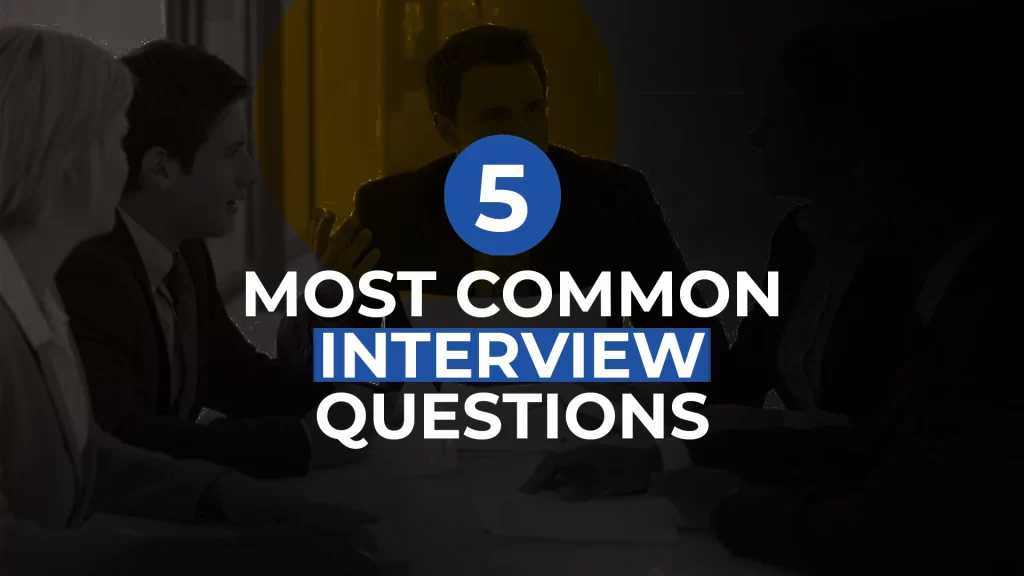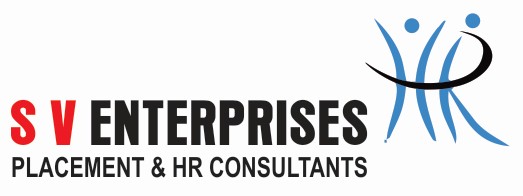5 Common Interview Questions and How to Answer Them

Job interviews can be nerve-wracking, especially if you’re not sure what to expect. However, with the right preparation, you can go into an interview feeling confident and ready to impress your potential employer. One of the keys to interview success is anticipating common interview questions and thinking about how you would answer them. In this blog, we’ll take a look at five of the most common interview questions and provide tips on how to answer them. With these tips in mind, you’ll be able to demonstrate your skills and qualifications to the interviewer, and increase your chances of landing the job.
1.”Tell me about yourself.”
This question is often used as an icebreaker, and it’s a good opportunity to give a brief summary of your professional background and qualifications. Avoid personal details such as your hobbies, family, or where you grew up. Instead, focus on your relevant work experience and how it relates to the position you’re applying for. Highlight your strengths and achievements, and explain how they make you a good fit for the role.
This example is for you:
Interviewer: “Tell me about yourself.”
Job seeker: “I’d be happy to. My name is Sarah and I’m a software engineer with 5 years of experience working in the tech industry. I started my career at a small startup where I gained experience in front-end development and project management. Since then, I’ve had the opportunity to work for larger companies, where I’ve focused on back-end development and data analysis. I’m excited about the opportunity to apply my skills to the position at your company and to continue learning and growing in the field of software engineering.”
In this example, the job seeker starts by introducing themselves and providing their name and professional background. They then provide a brief summary of their experience, highlighting the skills they’ve developed and the types of roles they’ve held. Finally, they tie their experience to the position they’re applying for and show enthusiasm for the opportunity. This response is effective because it is concise, relevant, and showcases the job seeker’s strengths and qualifications.
2.”What are your greatest strengths?”
This question is designed to help the interviewer learn more about your professional skills and strengths. It’s important to be honest, but also to choose strengths that are relevant to the job. Think about the skills required for the position and choose strengths that match. Be sure to provide examples of how you’ve demonstrated those strengths in the past. This example is for you:
Interviewer: “What are your greatest strengths?”
Job seeker: “I would say that my greatest strengths are my strong communication skills and my ability to work collaboratively with others. In my current position as a project manager, I have to work closely with a diverse team of stakeholders, and I’ve found that my ability to communicate effectively and build strong relationships with my team members has been key to our success. I also have strong problem-solving skills, which have allowed me to develop creative solutions to complex problems and to adapt to changes in project scope or timeline.”
In this example, the job seeker first identifies their two greatest strengths, which are communication and collaboration skills. They then provide specific examples of how these strengths have been valuable in their previous role, and explain how they can apply them to the new position. Additionally, the job seeker mentions their problem-solving skills, which is another relevant strength that can be valuable to the employer. Overall, this response is effective because it highlights specific skills that the job seeker possesses and provides evidence of how they can contribute to the organization’s success.
3.”What are your weaknesses?”
This question can be tricky, as you don’t want to give the impression that you’re not qualified for the job. Instead, choose a weakness that you’re actively working to improve. For example, you might say that you sometimes struggle with time management, but you’ve been taking steps to improve your organization and planning skills. This example is for you:
Interviewer: “What are your weaknesses?”
Job seeker: “One area that I’m currently working to improve is my public speaking skills. I’ve always been someone who prefers to work behind the scenes, and I find that I get nervous when I have to give presentations or speak in front of large groups. However, I’ve recognized the importance of being able to communicate effectively in these situations, and I’m taking steps to improve my skills. For example, I’ve joined a local Toastmasters club, which has helped me build my confidence and improve my speaking abilities.”
In this example, the job seeker identifies a weakness, which is their public speaking skills. However, instead of simply stating the weakness and leaving it at that, the job seeker also explains how they are actively working to improve in this area. By mentioning their involvement in a local Toastmasters club, the job seeker shows that they are taking concrete steps to address the weakness and are committed to personal and professional growth. This response is effective because it demonstrates a willingness to acknowledge areas for improvement and a proactive approach to addressing those weaknesses.
4.”Why do you want this job?”
The interviewer wants to know what specifically attracts you to this position and company. Do your research and show that you’ve thought about why you’re a good fit for the job. Highlight the aspects of the job that interest you and explain why you’re excited about the opportunity to work for the company. tThis example is for you:
Interviewer: “Why do you need this job?”
Job seeker: “There are several reasons why I’m excited about the opportunity to work at this company. First and foremost, I believe that my skills and experience align well with the requirements of the position. I have a strong background in project management, and I’m confident that I can make meaningful contributions to the team and help the company achieve its goals.
Secondly, I’m drawn to the company’s mission and values. I’ve done my research and I’m impressed by the organization’s commitment to innovation and sustainability, as well as its dedication to fostering a diverse and inclusive workplace.
Finally, I’m looking for a company where I can grow and develop my skills over the long-term. I believe that this company offers the opportunities and resources I need to continue to learn and advance my career, and I’m excited about the prospect of being part of a team that is committed to excellence.”
In this example, the job seeker provides several reasons why they are interested in the position and why they believe they would be a good fit for the company. They demonstrate an understanding of the company’s mission and values, which indicates that they have done their research and are genuinely interested in the organization. Additionally, the job seeker shows a commitment to long-term growth and development, which suggests that they are looking for a position that offers both immediate benefits and long-term career opportunities. Overall, this response is effective because it highlights the job seeker’s qualifications and their alignment with the company’s values and mission, while also showing a long-term commitment to the company.
5.”Do you have any questions for me?”
This is an opportunity for you to show your interest and engagement in the position and company. Ask thoughtful questions that demonstrate your research and knowledge of the company, the industry, or the position. For example, you might ask about the company culture, growth opportunities, or the typical career trajectory for the position you’re applying for. This example is for you:
Interviewer: “Do you have any questions for me?”
Job seeker: “Yes, I actually do have a few questions. First of all, I’m curious about the company culture and what it’s like to work here. Could you tell me a bit about the work environment and how employees are supported and encouraged to grow and develop their skills?”
Interviewer: “Sure, we have a very collaborative and supportive culture here. We believe in providing our employees with the resources and support they need to succeed, and we encourage professional development through training and other opportunities.”
Job seeker: “Great, that’s really helpful to know. Another question I had is about the team I would be working with. Could you tell me a bit about the team dynamics and how team members work together to achieve their goals?”
Interviewer: “Absolutely. Our team is very close-knit and we work closely together to meet our objectives. We believe in open and transparent communication, and we encourage team members to share their ideas and work collaboratively to solve problems.”
Job seeker: “That sounds like a great environment to work in. One final question I had is about the company’s plans for the future. I’m curious about where the company is headed and what its long-term goals are. Could you speak to that a bit?”
Interviewer: “Yes, we have some exciting plans for the future, including expanding into new markets and developing new products and services. We’re also committed to sustainability and social responsibility, and we believe that our company can make a positive impact in the world.”
Job seeker: “Thank you, that’s very helpful. I appreciate you taking the time to answer my questions.”
In this example, the job seeker demonstrates their interest in the company and their commitment to learning more about the organization. They ask thoughtful and specific questions that show they have done their research and are genuinely interested in the company’s culture, team dynamics, and future plans. By asking these questions, the job seeker also shows that they are actively thinking about how they could contribute to the company’s success and grow their career within the organization. Overall, this response is effective because it shows the job seeker’s engagement and curiosity, and also provides the interviewer with an opportunity to share more information about the company and its goals.
Remember, the key to answering interview questions is to be prepared and honest. Practice your responses ahead of time and be confident in your abilities and experience.
IF YOU ARE LOOKING FOR JOB- APPLY NOW TO GET BEST RECRUITMENT SERVICE IN MUMBAI
By S V Enterprises Placement & HR Consultants
Click here- The Top 5 Skills in High Demand by Employers in 2023
All the Best for Your Interview !!!
